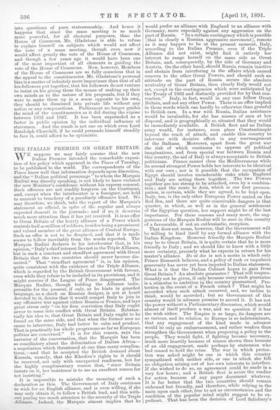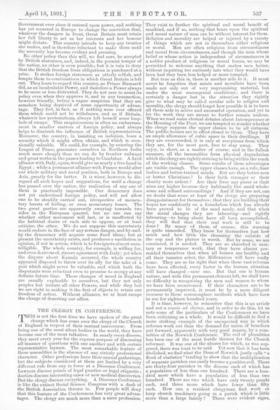THE ITALIAN PREMIER ON GREAT BRITAIN.
WE suppose we may fairly assume that the now Italian Premier intended the remarkable exposi- tion of his policy which appeared in the Times of Tuesday, to be published to the world. The correspondents of the Times know well that information depends upon discretion, and the " Italian political personage ' to whom the Marquis Rudini was directly speaking, is not likely to have violated the new Minister's confidence without his express consent. Such offences are not readily forgiven on the Continent, and, except when the interlocutor is a foreigner, are held to amount to treachery of a peculiarly offensive kind. We may therefore, we think, take the report of the Marquis's statement as official, in spite of the regular and always expected dementi in the journals ; and if so, it deserves much more attention than it has yet received. It is an offer to Great Britain of the hearty alliance of a Power which controls half-a-million of soldiers, besides being a prominent and valued member of the great alliance of Central Europe. Such an offer is not to be despised, and that it is made seems to follow inevitably from the words reported. The Marquis Rudini declares to his interlocutor that, in his opinion, "Italy's chief interest lies .not in the Triple Alliance, but in such a constant and steadfast agreement with Great Britain that the two countries should never become dis- united." That "steadfast agreement" is, in his opinion, quite consistent with the existence of the Triple Alliance, which is regarded by the British Government with favour, even while they refuse to be included in its provisions, and it might survive if the League of Peace disappeared. The Marquis Rudini, though holding the Alliance indis- pensable for the present, if only, as he hints in guarded language, as a check on Russian designs, is not at heart devoted to it, denies that it would compel Italy to join in any offensive war against either Russia or France, and lays great stress only " on his firm conviction that Italy ought never to come into conflict with Great Britain. Substan- tially his idea is, that Great Britain and Italy ought to be found on the same side, and that when the former sees uo cause to intervene, Italy had better be calm and prudent. That is practically his whole programme so far as European politics are concerned." It is for this reason, says the narrator of the conversation, that the Marquis has been so conciliatory about the delimitation of Italian Africa— a negotiation which threatened at one time many complica- tions,—and that he accepted the British demand about Kassala, namely, that the Khedive's rights to it should be reserved, not only with unexpected readiness, but for the highly complimentary reason that, " since Britain insists on it, her insistence is to me an excellent reason for not insisting." It is impossible to mistake the meaning of such a declaration as this. The Government of Italy continues to wish for an English alliance, and is even willing, if she may only obtain it, to follow a British lead, and this with- out paying too much attention to the security of the Triple Alliance. Indeed, the Marquis almost implies that he would prefer an alliance with England to an alliance with Germany, more especially against any aggression on the part of Russia. " In a certain contingency which is possible that is clearly a Russian aggressive movement], remote as it may happen to .be at the present moment, Italy, according to the Italian Premier, even if the Triple Alliance did not exist, might find it entirely her interest to range herself on the same side as Great Britain, and, consequently, by the side of Germany and Austria. On the other hand, should Russia remain inactive and abstain from interfering in the affairs which caused concern to the other Great Powers, and should such an attitude on the part of Russia secure the absolute neutrality of Great Britain, then clearly Italy would not act, except in the contingencies which were anticipated by the Treaty of 1882 and distinctly provided for by that con- vention." Italy, in fact, would in any case follow Great Britain, and not any other Power. There is an offer implied in those words which can hardly be otherwise than grateful to British ears. In a war with Russia, Italian assistance would be invaluable, for she has masses of men at her disposal, and is geographically so situated that they would be immediately available. A British fleet and an Italian army would, for instance, soon place Constantinople beyond the reach of attack, and enable this country to intervene with decisive effect in any rearrangement of the Balkans. Moreover, apart from the great war the risk of which continues to oppress all political imaginations, and from special war between Russia and this country, the aid of Italy is always acceptable to British politicians. France cannot close the Mediterranean while its second strongest Power holds her interests to be identical with our own ; nor is it possible that the occupation of Egypt should involve unendurable risks while England and Italy are acting there together. The two Powers together are too strong to be attacked, even by a combina- tion ; and the route to Asia, which is our first preoccu- pation, is certain, while they are agreed, to be kept open. Italy, too, is the only other European Power seated on the Red Sea, and there are quite conceivable dangers in that quarter, in which, as well as in the general settlement of the Egyptian question, her support might be of the last importance. For these reasons and many more, the sug- gestions of the Marquis Rudini will be sure in this country of a favourable, if not an enthusiastic, reception. That does not mean, however, that the Government will be willing to bind itself by any formal alliance with the Italian Kingdom. However friendly the Marquis Rudini may be to Great Britain, it is quite certain that he is more friendly to Italy ; and we should like to know with a little more certainty, precisely what he expects in return for his master's alliance. Do ut des is not a motto in which only Prince Bismarck believes, and a policy of rash or impulsive generosity has never yet been imputed to Italian statesmen. What is it that the Italian Cabinet hopes to gain from Great Britain P An absolute guarantee ? That will unques- tionably not be given, if only because every such guarantee is a stimulus to ambition in the country guaranteed. Pro- tection in the event of a French attack P That might be accorded when such attack occurred, and, we incline to think, would be accorded; but no Government of this country would in advance promise to accord it. It has not the power without a Parliamentary discussion, which would almost of itself produce a war, and we question if it has the wish either. The Empire is so large, its dangers are so various, and its relation to Europe is so indeterminate, that any engagement of the kind made in advance would. be only an embarrassment, and rather weaken than strengthen the Government when proposing a policy to the people. They would fight, if fighting became necessary, much more heartily because of reason shown than because of an old engagement, made perhaps by statesmen who had ceased to hold the reins. The war in which protec- tion was asked. might be one is which this country sympathised with neither side, or one in which she felt no obligation arising out of her own interests to interfere. If she wished to do so, an agreement could be made in a very few hours ; and, a- British fleet is never the readier for action because of any paper document whatever. It is far better that the two countries should remain unbound but friendly, and therefore, while relying in the main upon each other, free to act as circumstances and the condition of the popular mind might suggest to be ex- pedient. That has been the decision of Lord Salisbury's Government ever since it entered upon power, and, nothing has yet occurred in Europe to change the conviction that, whatever the dangers in front, Great Britain must retain her full liberty to act as her interests and her honour might dictate, This country intends to keep any treaties she makes, and is therefore reluctant to make them until the necessity has become evident and pressing. No other policy than this will, we feel sure, be accepted by British statesmen, and, indeed, in the present temper of the nation, no other is even possible; but it is vain to deny that the British freedom from obligations is purchased. at a price. It strikes foreign statesmen as utterly selfish, and tempts them to combinations in which Great Britain is left out. They learn to regard this country, as Prince Bismarck did, as an incalculable Power, and therefore a Power always to be more or less distrusted. They do not care to assist its policy even when they approve it, and in any transaction, however friendly, betray a vague suspicion that they are somehow being deprived of some opportunity of advan- tage. They feel, in fact, as if nothing were ever offered them which could not be withdrawn, and as if Britain, whatever her protestations, always left herself some loop- hole of escape. This suspiciousness is often an embarrass- ment in smaller matters of foreign policy, and always helps to diminish the influence of British representatives. Moreover, the country, in insisting on isolation, loses a security which it might often obtain, and which is occa- sionally valuable. We could, for example, by entering the League of Peace, guarantee ourselves in Northern India much more cheaply than we can do by frontier railways and great works in the passes leading to Candahar. A fixed alliance with Italy, again, would give us nearly a free hand in Egypt ; while a permanent alliance with France would alter our whole military and naval position, both in Europe and Asia, greatly for the better. It is wiser, however, to dis- regard all such hopes and suggestions, for until a change has passed over the nation, the realisation of any one of them is practically impossible. Our democracy does not yet understand foreign policy, and will not allow one to be steadily carried out, irrespective of momen- tary bursts of feeling, or even momentary losses. The two great parties are apparently swaying towards two sides in the European quarrel, but no one can say whether either movement will last, or is unaffected by the habitual desire of each side to oppose, or at least criticise, the other. We do not suppose this uncertainty would endure in the face of any serious danger, and by-and- by the democracy will acquire some fixed ideas; but at present the uncertainty exists, and produces a vacillation in opinion, if not in action, which is to foreigners almost unin- telligible. The whole country, for example, is willing for, and even desirous of, sincere agreement with Italy; yet when the dispute about Kassala occurred, the whole country appeared disposed to throw over its ally for the sake of a post which might never be valuable, and which both the disputants were reluctant even to promise to occupy at any definite future time. These changes of mood in England are usually explicable to ourselves, but they not only perplex but irritate all other Powers, and while they lest we are right in making it the first of objects to retain our freedom of action. Without alliances, we at least escape the charge of deserting our allies.



































 Previous page
Previous page